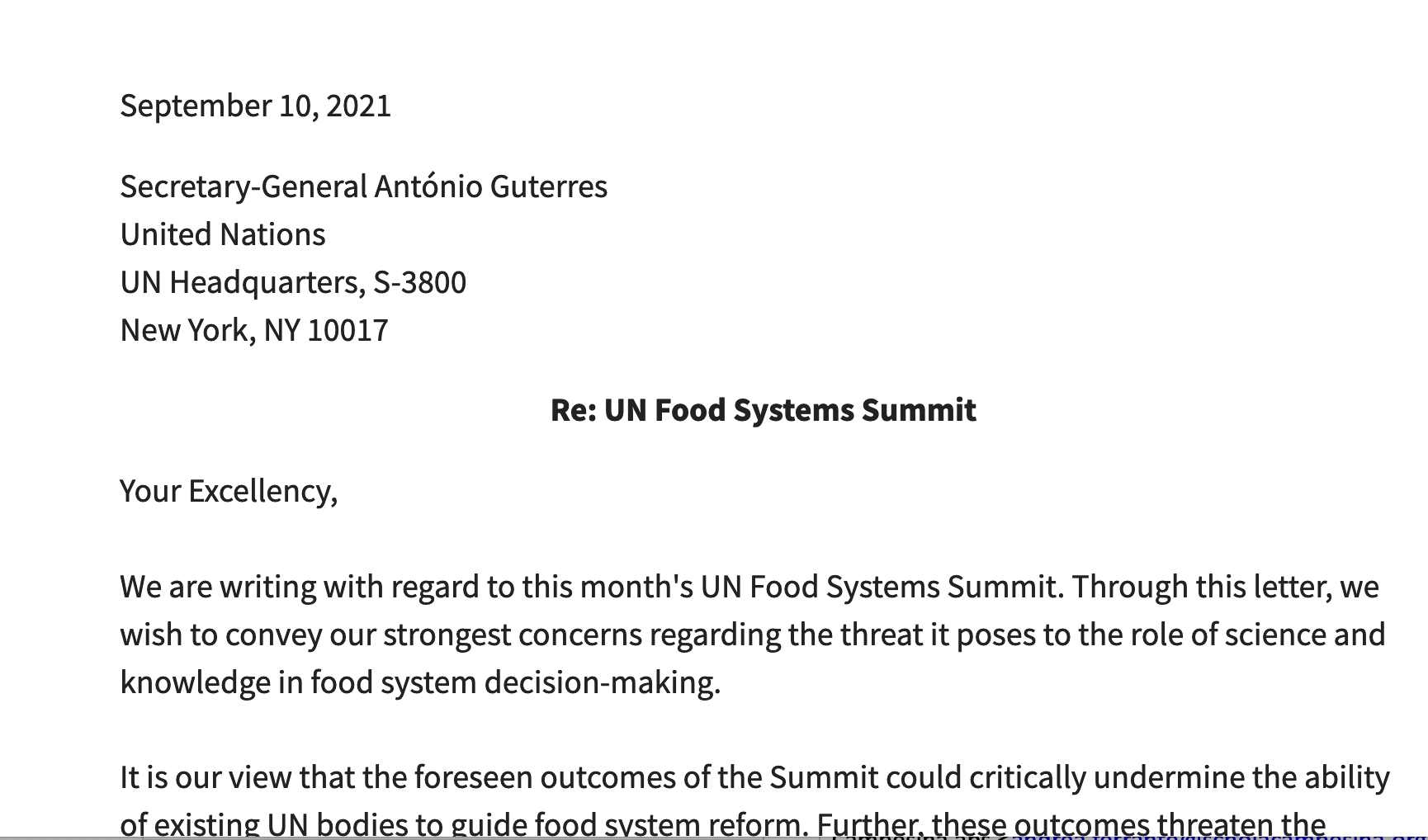Check : https://www.foodsystems4people.org/
Secretary-General António Guterres
United Nations
UN Headquarters, S-3800
New York, NY 10017
Re: UN Food Systems Summit
Your Excellency,
We are writing with regard to this month’s UN Food Systems Summit. Through this letter, we
wish to convey our strongest concerns regarding the threat it poses to the role of science and
knowledge in food system decision-making.
It is our view that the foreseen outcomes of the Summit could critically undermine the ability
of existing UN bodies to guide food system reform. Further, these outcomes threaten the
ability of the UN system to maintain the trust and buy-in of many food system actors. These
developments are therefore of major concern to us in our respective roles.
We believe that science has an essential role to play in informing food system policies.
However, we have noted with concern the proposals for a new science-policy interface to be
established in the wake of the Food Systems Summit – either by extending the mandate of the
Summit’s Scientific Group, or by establishing a permanent new panel or coordinating
mechanism in its mould.
Concerns about these plans have been flagged by more than 270 independent scientists, the
UN Special Rapporteur on the Right to Food, the High Level Panel of Experts on Food Security
and Nutrition (HLPE) of the UN Committee on World Food Security (CFS), the International
Panel of Experts on Sustainable Food Systems (IPES-Food), leading global governance
experts, and a range of civil society groups.
The key concerns are the following:
First, tasking a new body with assessing food system science risks undermining the role and
remit of the HLPE. This body already provides scientific guidance to governments through the
CFS. As more than 270 scientists warned in an open letter to policymakers in July, the creation
of a new science panel would fragment the governance of food systems and critically
undermine the CFS. Yet, the CFS was reformed in 2009, following the food price crisis of
2007-2008, precisely in order to improve coherence across food-related policies, and to
establish an inclusive platform to ensure legitimacy across a broad range of constituencies.
Second, the approach to science taken by the Summit’s Scientific Group excludes the voices
of many food system actors. The Scientific Group is constituted almost entirely of natural
scientists and economists. The assessments it has conducted and commissioned have failed
to sufficiently consider the consequences of innovations on marginalized and poor people;
have placed technological innovations above social innovations, despite the importance of
the latter, as recognized by SDG 12 (responsible consumption and production); and have not
been opened up to public review. Proposals for a permanent science panel in this mould
seem to rule out consultation with stakeholders on the grounds that it may distract from
‘scientific’ assessment. This reflects what is now a widely discredited view: that science is
objective and devoid of special interests.
By contrast, the HLPE, like the IPCC, conducts open consultations on its assessment of
existing research, co-identifies critical issues for the future of food systems with stakeholders,
and subjects its reports to extensive peer review. This ensures that its findings serve the needs
of its constituents, are policy relevant, and take into account a wide set of perspectives on key
questions.
Third, extending the Scientific Group’s remit beyond the Summit, or turning it into a
permanent body, would contradict commitments to use the Summit to support and
strengthen existing institutions rather than building new ones. As noted by the UN Special
Rapporteur on the Right to Food, “the UN Committee on World Food Security should be
where the Summit outcomes are ultimately discussed and assessed, using its inclusive
participation mechanisms”.
We therefore urge you to ensure that the outcomes of the UN Food Systems Summit do not go
down this dangerous path. In the wake of the Summit, it will be imperative to restore faith in
the UN system. The people on the frontlines of our food systems need reassurances that the
institutions in which they have invested time, energy and hope – the institutions where they
feel heard – still matter. Scientific advice for policymakers should not be fast-tracked if this
means excluding the diverse perspectives that make it relevant in the first place. A clear
commitment to support and strengthen the HLPE and the CFS would therefore be invaluable.
Notwithstanding the concerns above, there is much to be done to ensure that the HLPE of the
CFS is equipped to continue playing its crucial role at the interface of food system science and
policy. A number of suggestions in that regard have been made by the co-signatories of this
letter and many others, and we hope to engage in fruitful dialogue on this topic.
Yours sincerely,
Olivier De Schutter, UN Special Rapporteur on Extreme Poverty and Human Rights, former UN
Special Rapporteur on the Right to Food (2008-2014), Co-chair of IPES-Food
Michael Fakhri, UN Special Rapporteur on the Right to Food
Thanawat Tiensin, Chair, Committee on World Food Security (CFS)
Martin Cole, Chair, High Level Panel of Experts on Food Security and Nutrition (HLPE)



